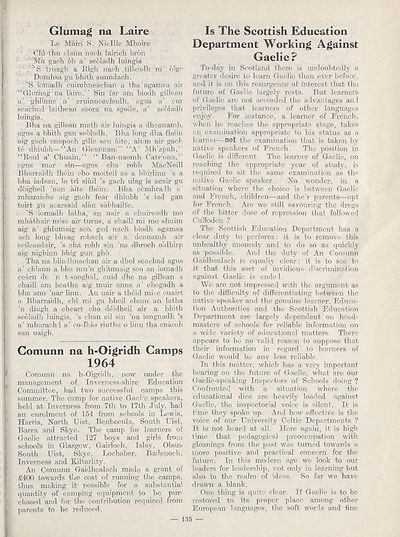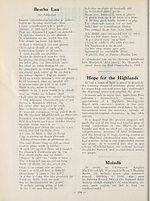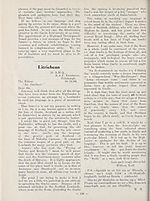An Comunn Gàidhealach Publications > Gaidheal > Volumes 58--62(part), January, 1963--March 1967
(387) Page 135
Download files
Complete book:
Individual page:
Thumbnail gallery: Grid view | List view

Glumag na Laire
Le MMri S. Nicllle Mhoire '
- ('fil thh olann hach fairicH bron '
!\Iu ga^'b 6b a: seoladh luingis
. ' , ‘S; truagh a Eigh nach tiHeadh^m’;prgs
! ' Bomhsa gu bhitb sunndacli.
'S iomadh cuimhneachan a tha agamsa air
‘4XjJIuiitiag'na laire.’’ Sin far am biodh gillean
a’, "gblinne ..a’ cruinneacbadh, agog a’ cur
seanhad laitbean'.saora na sgoile, a’ sebladb
luingis.
Bha na gillean math air luingis a dbeanamb,
agus a bhith gan sebfadh. Bha long dha fhein
aig gacb cnapach gille san aite, ainm air gach
te dhiubh— “An Gleannan.’ ’ “A’ Mh’zpah,
“Real a’ Chuain,” “ Ban-naomh Catrona,
agus mar sin—agus cha robh MacNeill
Bharraidh fhein cho moiteil as a bhirlinn ’s a
bha iadsan, le tri siuil ’s gach ulag is acair gu
doigheil ’nan aite fliein. Bha comhradh a’
mlmraiche aig gach fear dhiubh ’s iad gan
toirt gu acarsaid slan sabhailte.
. ’S iomadh latha,’ an uair a chuireadh mo
nxhathair mise air turns, a ehailH mi mo shuim
aig a’ ghlumaig seo, ged nacb biodh agamsa
ach long bheag robach a:f' a deanamh air
seileasdair, ’s cha robh sin ’na dhroch oidhirp
aig nighinn bhig gun gh6.
Tha na bliadhnachan air a dhol seachad agus
a’ chlann a bha mui’n ghlfumaig seo an iomadh
cearn de ’n t-saoghal, cuid dhe na gillean a
chaill am beatha aig muir anns a’ chogadb a
bha ann ’nar linn. An uair a the id mi:-e cuairt
a Bharraidh, chi mi gu bheil clann an latha
’n diugh a cheart cho deidheil air a bhith
seoladh luingis, ’s chan eil sin ’na iongnadh ’s
a’ mharachl a’ co-fhks riutha O' linn tha cnamh
san uaigh.
Comunn na h-Oigridh Camps
1964
I Comunn na h-Oigridh, now under the
P management of Inverness-shire Education
ijt Committee, had two successful camps this
r summer. The camp for native Gaehc speakers,
p held at Inverness from 7th to 17th July, had
i an enrolment of 154 from schools in Lewis,
f Harris, North Uist, Benbecula, South Uist,
k Barra and Skye. The camp for learners of
I Gaelic attracted 127 hoys and girls from
I school's in Glasgow, Gairloch, Islay, Oban,
j( South Uist, Skye, Lochaber, Badenoch,
T Inverness and Kiltarlity.
An Comunn Gaidhealach made a grant of
£400 towards the cost of running the camps,
i thus making it possible for a substantial
I? quantity of camping equipment to be pur-
|| chased and for the contribution required from
!: parents to be reduced.
Is The Scottish Education
Department Working Against
Gaelic?
To-day in Scotland there is undoubtedly a
greater desire to learn Gaelic than ever before,
andj it is on this resurgence of interest that the
future of Gaelic largely rests. But learners
of Gaelic are not accorded the advantages ani
privileges that learners of other languages
enjoy. For instance, a learner of French,
when he reaches the appropriate stage, takes
an examination appropriate to his status as a
learner—not the examination that is taken by
native speakers of French. The position in
Gaelic is different. The learner of Gaelic, on
reaching the appropriate year of study, is
required to sit the same examination as the
native Gaelic speaker. No wonder, in a
situation where the choice is between Gaelic
and French, children—and the’r parents—opt
for French. Are we still savouring the dregs
of the bitter dose of repression that followed
Culoden ?
The Scottish Education Department has a
clear duty to perform: it is to remove this
unhealthy anomaly and to do so as quickly
as possible. And the duty of An Comunn
Gaidhealach is equally clear: it is to see to
it that this sort of invidious discrimination
against Gaelic is ended.
We are not impressed with the argument as
to the difficulty of differentiating between the
native speaker and the genuine learner. Educa¬
tion Authorities and the Scottish Education
Department are largely dependent on head¬
masters of schools for reliable information on
a wide variety of educational matters. There
appears to be no valid; reason to suppose that
their information in regard to learners of
Gaelic would be any less reliable.
In this matter, which has a very important
bearing on the future of Gaelic, what are our
Gaelic-speaking Inspectors of Schools doing ?
Confronted with a situation where the
educational dice are heavily loaded against
Gaelic, the inspectorial voice is silent. It is
time they spoke up. And how effective is the
voice of our University Celtic Departments ?
It is not heard at all. Here again, it is high
time that pedagogical preoccupation with
gleanings from the past was turned towards a
more positive and practical concern for the
future. In this modern age we look to our
leaders for leadership, not only in learning but
also in the realm of ideas. So far we have
drawn a blank.
One thing is quits clear. If Gaelic is to be
restored to its proper place among other
European languages, the soft words and fine
Le MMri S. Nicllle Mhoire '
- ('fil thh olann hach fairicH bron '
!\Iu ga^'b 6b a: seoladh luingis
. ' , ‘S; truagh a Eigh nach tiHeadh^m’;prgs
! ' Bomhsa gu bhitb sunndacli.
'S iomadh cuimhneachan a tha agamsa air
‘4XjJIuiitiag'na laire.’’ Sin far am biodh gillean
a’, "gblinne ..a’ cruinneacbadh, agog a’ cur
seanhad laitbean'.saora na sgoile, a’ sebladb
luingis.
Bha na gillean math air luingis a dbeanamb,
agus a bhith gan sebfadh. Bha long dha fhein
aig gacb cnapach gille san aite, ainm air gach
te dhiubh— “An Gleannan.’ ’ “A’ Mh’zpah,
“Real a’ Chuain,” “ Ban-naomh Catrona,
agus mar sin—agus cha robh MacNeill
Bharraidh fhein cho moiteil as a bhirlinn ’s a
bha iadsan, le tri siuil ’s gach ulag is acair gu
doigheil ’nan aite fliein. Bha comhradh a’
mlmraiche aig gach fear dhiubh ’s iad gan
toirt gu acarsaid slan sabhailte.
. ’S iomadh latha,’ an uair a chuireadh mo
nxhathair mise air turns, a ehailH mi mo shuim
aig a’ ghlumaig seo, ged nacb biodh agamsa
ach long bheag robach a:f' a deanamh air
seileasdair, ’s cha robh sin ’na dhroch oidhirp
aig nighinn bhig gun gh6.
Tha na bliadhnachan air a dhol seachad agus
a’ chlann a bha mui’n ghlfumaig seo an iomadh
cearn de ’n t-saoghal, cuid dhe na gillean a
chaill am beatha aig muir anns a’ chogadb a
bha ann ’nar linn. An uair a the id mi:-e cuairt
a Bharraidh, chi mi gu bheil clann an latha
’n diugh a cheart cho deidheil air a bhith
seoladh luingis, ’s chan eil sin ’na iongnadh ’s
a’ mharachl a’ co-fhks riutha O' linn tha cnamh
san uaigh.
Comunn na h-Oigridh Camps
1964
I Comunn na h-Oigridh, now under the
P management of Inverness-shire Education
ijt Committee, had two successful camps this
r summer. The camp for native Gaehc speakers,
p held at Inverness from 7th to 17th July, had
i an enrolment of 154 from schools in Lewis,
f Harris, North Uist, Benbecula, South Uist,
k Barra and Skye. The camp for learners of
I Gaelic attracted 127 hoys and girls from
I school's in Glasgow, Gairloch, Islay, Oban,
j( South Uist, Skye, Lochaber, Badenoch,
T Inverness and Kiltarlity.
An Comunn Gaidhealach made a grant of
£400 towards the cost of running the camps,
i thus making it possible for a substantial
I? quantity of camping equipment to be pur-
|| chased and for the contribution required from
!: parents to be reduced.
Is The Scottish Education
Department Working Against
Gaelic?
To-day in Scotland there is undoubtedly a
greater desire to learn Gaelic than ever before,
andj it is on this resurgence of interest that the
future of Gaelic largely rests. But learners
of Gaelic are not accorded the advantages ani
privileges that learners of other languages
enjoy. For instance, a learner of French,
when he reaches the appropriate stage, takes
an examination appropriate to his status as a
learner—not the examination that is taken by
native speakers of French. The position in
Gaelic is different. The learner of Gaelic, on
reaching the appropriate year of study, is
required to sit the same examination as the
native Gaelic speaker. No wonder, in a
situation where the choice is between Gaelic
and French, children—and the’r parents—opt
for French. Are we still savouring the dregs
of the bitter dose of repression that followed
Culoden ?
The Scottish Education Department has a
clear duty to perform: it is to remove this
unhealthy anomaly and to do so as quickly
as possible. And the duty of An Comunn
Gaidhealach is equally clear: it is to see to
it that this sort of invidious discrimination
against Gaelic is ended.
We are not impressed with the argument as
to the difficulty of differentiating between the
native speaker and the genuine learner. Educa¬
tion Authorities and the Scottish Education
Department are largely dependent on head¬
masters of schools for reliable information on
a wide variety of educational matters. There
appears to be no valid; reason to suppose that
their information in regard to learners of
Gaelic would be any less reliable.
In this matter, which has a very important
bearing on the future of Gaelic, what are our
Gaelic-speaking Inspectors of Schools doing ?
Confronted with a situation where the
educational dice are heavily loaded against
Gaelic, the inspectorial voice is silent. It is
time they spoke up. And how effective is the
voice of our University Celtic Departments ?
It is not heard at all. Here again, it is high
time that pedagogical preoccupation with
gleanings from the past was turned towards a
more positive and practical concern for the
future. In this modern age we look to our
leaders for leadership, not only in learning but
also in the realm of ideas. So far we have
drawn a blank.
One thing is quits clear. If Gaelic is to be
restored to its proper place among other
European languages, the soft words and fine
Set display mode to:
![]() Universal Viewer |
Universal Viewer | ![]() Mirador |
Large image | Transcription
Mirador |
Large image | Transcription
| An Comunn Gàidhealach > An Comunn Gàidhealach Publications > Gaidheal > Volumes 58--62(part), January, 1963--March 1967 > (387) Page 135 |
|---|
| Permanent URL | https://digital.nls.uk/127153425 |
|---|
| Description | This contains items published by An Comunn, which are not specifically Mòd-related. It includes journals, annual reports and corporate documents, policy statements, educational resources and published plays and literature. It is arranged alphabetically by title. |
|---|
| Description | A collection of over 400 items published by An Comunn Gàidhealach, the organisation which promotes Gaelic language and culture and organises the Royal National Mòd. Dating from 1891 up to the present day, the collection includes journals and newspapers, annual reports, educational materials, national Mòd programmes, published Mòd literature and music. |
|---|---|
| Additional NLS resources: |
|

